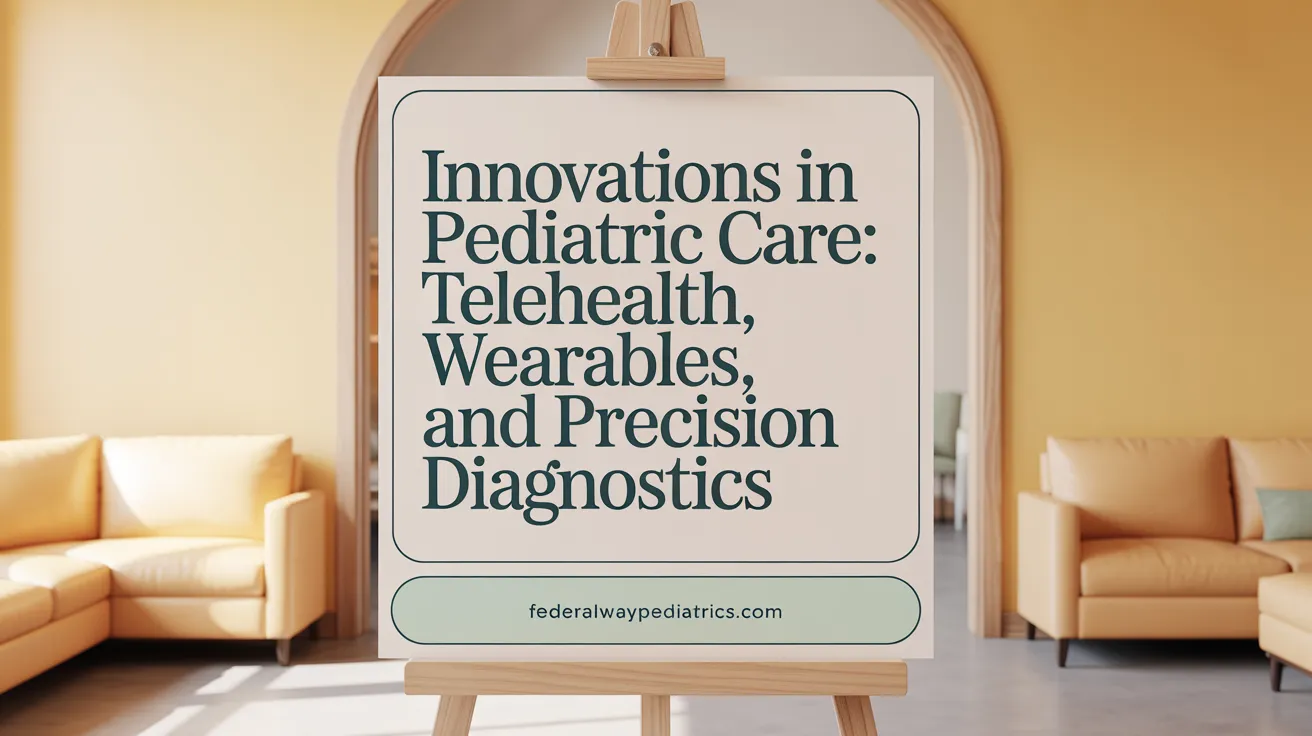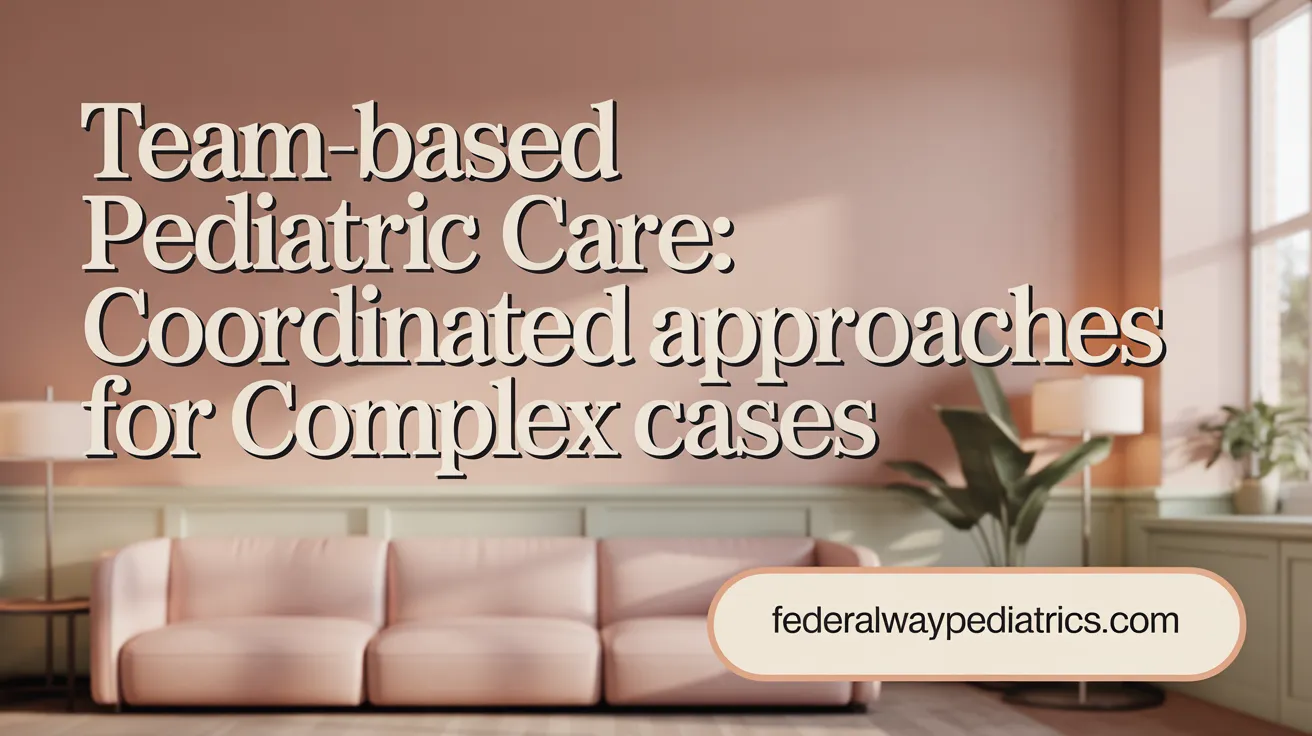Introduction to Personalized Pediatric Healthcare
Understanding Personalized Pediatric Care
Personalized pediatric healthcare is a patient-centered approach that tailors medical treatments and services to meet the unique needs of each child. This approach considers factors such as family history, cultural backgrounds, behavioral insights, and individual health profiles to create comprehensive care plans.
The Importance of Comprehensive Care
Comprehensive pediatric care addresses not only physical health but also emotional, developmental, and mental well-being. It encompasses routine well-child visits to monitor growth and development, immunizations to prevent diseases, and mental health services to support behavioral and emotional challenges.
Tailoring Treatment to Each Child
Healthcare providers develop individualized treatment strategies that reflect the specific conditions, risk factors, and circumstances of the child. This personalized attention ensures better outcomes by integrating family input, ongoing health monitoring, and access to specialized pediatric services when needed.
Through this personalized and comprehensive framework, pediatric care aims to support the whole child, promoting long-term health and development in a supportive and accessible environment.
Foundations of Personalized Pediatric Care: Family History and Behavioral Insights
Incorporating Family Medical History in Treatment Planning
Understanding a child's family medical history is a fundamental step in creating personalized pediatric care plans. Providers gather detailed information about genetic conditions, chronic illnesses, and patterns of diseases within the family. This knowledge helps anticipate potential health risks and tailor preventive measures or treatments. For example, a family history of asthma or heart disease prompts more vigilant monitoring and early intervention strategies.
Cultural Backgrounds and Behavioral Insights Influencing Care
Cultural sensitivity plays a crucial role in pediatric healthcare. Children's health is not only affected by biology but also by cultural practices, dietary habits, language preferences, and health beliefs. Incorporating these factors ensures that treatment plans are respectful and relevant to each family’s lifestyle. Pediatricians consider behavioral insights, such as developmental milestones influenced by environment, to support more effective communication and engagement with both the child and caregivers.
Benefits of Personalized Care Plans for Better Health Outcomes
Personalized care plans that integrate family history, cultural context, and behavioral factors lead to improved health outcomes. These plans promote early detection of conditions, optimize adherence to treatment, and enhance the family's trust in healthcare providers. Customized interventions can reduce unnecessary procedures and prevent complications, ultimately contributing to healthier growth and development. Families feel empowered and supported through this tailored approach, which strengthens the overall quality of pediatric care.
Leveraging Technology to Enhance Personalized and Accessible Care

How is telehealth and remote patient monitoring used in pediatric care?
Technology such as telehealth integration and remote patient monitoring plays a crucial role in making pediatric healthcare more personalized and accessible. Telemedicine in pediatric care enables families to consult with pediatricians from their homes, reducing barriers related to Overcoming transportation barriers, scheduling, and financial constraints. This approach is especially important for children in underserved areas like Healthcare access in Federal Way Washington, where direct access to specialty care may be limited. Wearable monitoring devices further allow clinicians to track vital signs and health status continuously, providing early warning signs and tailored interventions without frequent clinic visits.
How are electronic health records (EHR) and wearable devices integrated?
EHR systems coordinate comprehensive patient histories, immunizations, growth data, and treatment plans to provide individualized care. In pediatric settings, EHRs facilitate communication among multidisciplinary pediatric healthcare team including primary care, specialists, and behavioral health clinicians. The integration of wearable monitoring devices—such as activity trackers or heart monitors—enhances real-time data collection, enabling more accurate assessments and personalized health recommendations. These tools improve prevention strategies and chronic condition management by providing timely insights to healthcare providers.
What is the role of innovative diagnostic assays in pediatric precision medicine?
Advancements in diagnostic assays are transforming pediatric care by enabling precision medicine in pediatric care approaches. Biomarkers in pediatric medicine identified through innovative assays allow early diagnosis and risk assessment, which are critical in conditions like pediatric cancers and primary immunodeficiencies. New technologies, including epigenetic qPCR assays for newborn diagnostics applied on minimally invasive sample collections like dried blood spots sample collection, support accurate diagnoses with minimal discomfort for children. These assays aid in monitoring disease progression and tailoring therapies uniquely suited to a child's biological profile, thereby improving treatment outcomes while minimizing interventions.
Through these technological enhancements, pediatric care becomes more responsive to each child's unique health needs while ensuring broad accessibility for families across various communities.
Comprehensive Pediatric Medical Care: Addressing Physical and Mental Health

Importance of well-child visits and immunizations
Well-child visits form the foundation of comprehensive pediatric medical care by regularly monitoring a child's growth and development. These visits include physical examinations, updates and reviews of immunization records, and provide opportunities for parents to discuss concerns. Immunizations administered during these appointments protect children against preventable diseases such as measles, mumps, rubella, varicella, and polio, playing a critical role in preventive pediatric care.
Integration of mental health services in pediatric care
Modern pediatric care increasingly embraces mental health as a vital component of a child's well-being. Services addressing anxiety, depression, and behavioral challenges are integrated within pediatric practices, often through a multidisciplinary pediatric healthcare team approach. This ensures that emotional and developmental health issues receive timely and appropriate attention alongside physical health needs.
Care coordination for chronic pediatric conditions
Children with chronic health conditions benefit from dedicated care coordination that facilitates seamless communication and management across multiple healthcare providers. This coordinated approach ensures that medication schedules and treatment plans are effectively followed, minimizing gaps in care. Clinics recognized as Patient-Centered Primary Care Homes excel in providing such coordinated, personalized services that support both the child and their family throughout ongoing treatment.
Specialized Pediatric Cardiology Services: Tailoring Heart Care to Young Patients

What is the scope of pediatric cardiology care?
Specialized pediatric cardiology offers comprehensive services that cover the entire spectrum of heart care for young patients. This includes prenatal cardiac consultations and fetal echocardiograms to monitor and diagnose heart conditions before birth. Care continues through infancy, childhood, adolescence, and into young adulthood, providing ongoing management for congenital and acquired heart diseases.
How accessible are cardiology clinics in regional communities like Federal Way?
Families in the South Puget Sound region have access to pediatric cardiology through multiple clinic locations, including a dedicated clinic in Federal Way. These clinics are part of the Seattle Children's Heart Center network, ensuring local care by pediatric cardiologists who are familiar with community needs. Facilities in Olympia, Silverdale, and Tacoma support accessible heart care without requiring families to travel large distances.
What collaborative care approaches and family-centered resources are available?
Pediatric cardiology care at these regional centers emphasizes collaboration among specialists, primary pediatricians, and family members to coordinate treatments and surgeries when needed. Family-centered resources such as support groups, child life specialists, and preoperative tours are provided to support both the child and their caregivers. These resources help families navigate the emotional and practical aspects of heart care, fostering a supportive, informed care environment. For more about Mary Bridge Children’s Hospital pediatric cardiology, visit their site offering pediatric heart care in Tacoma and cardiology services near Federal Way WA. For broader insights into family-centered resources in pediatric cardiology, refer to the linked resource.
Community Outreach and Accessibility: Overcoming Barriers in Pediatric Healthcare

How do community-based outreach programs and mobile clinics improve accessibility?
Community-based outreach programs and mobile clinics play an essential role in reaching underserved children and families, especially in areas like Federal Way, Washington. These initiatives bring healthcare services directly into communities where transportation or availability of services may be limited. Mobile clinics in Federal Way can provide primary care, immunizations, developmental screenings, and mental health services without families needing to travel long distances or navigate complex healthcare facilities. School partnerships for healthcare often enhance outreach by integrating health education and services in familiar environments, promoting early intervention and continuous care.
What are the common barriers to pediatric healthcare, and how are they addressed?
Families may face multiple barriers including lack of transportation, financial hardships, scheduling difficulties, and language differences. Healthcare providers and clinics have adopted several strategies to address these challenges. Telemedicine in pediatric care serves as a flexible option allowing families to consult pediatricians remotely, reducing the need for travel and accommodating busy schedules. Financial barriers are mitigated through legislative measures expanding insurance coverage expansion and ensuring telehealth reimbursement policies, making pediatric care more affordable. Cultural considerations in healthcare and multilingual staff further help to overcome language and cultural barriers, ensuring personalized and effective communication.
What legislative measures support accessible pediatric healthcare?
Legislative efforts bolster accessible pediatric healthcare by expanding insurance coverage and providing reimbursement incentives for telehealth services. These measures encourage pediatric providers to innovate care delivery models that are more adaptable and inclusive. Additionally, incentives are offered to support rural pediatricians working in underserved areas, helping maintain a strong workforce in regions that traditionally face provider shortages. Collectively, these policies help reduce gaps in healthcare access and promote equitable access to pediatric services for all children and families.
Together, these community outreach efforts and legislative supports form a comprehensive approach to ensuring all children receive quality pediatric care regardless of socioeconomic or geographic challenges.
Precision Medicine and Biomarkers: Advancing Tailored Treatments for Children
What is the role of biomarkers in pediatric diagnosis and treatment personalization?
Biomarkers have become essential tools in pediatric oncology precision medicine, helping clinicians achieve early diagnosis, risk assessment, and personalized treatment plans. They enable doctors to monitor disease progression and tailor therapies specifically to a child's biological profile. Specialized biomarkers called "bridging biomarkers" help apply adult-derived clinical data to pediatric populations, reducing the need for extensive pediatric trials and accelerating therapeutic development.
What are innovative sample collection methods suited for children?
Traditional blood draws can be challenging in children, leading to the development of child-friendly sample collection techniques. These include dried blood spots and minimally invasive methods like capillary blood collection for pediatrics. Such techniques require only small volumes of blood, minimizing discomfort and making repeated testing feasible. These advances are critical for routine screening, immune monitoring, and diagnosing complex conditions in newborns and children.
Are there case studies demonstrating technological advances in pediatric diagnostics?
A notable example involves the use of epigenetic qPCR assays for newborn diagnostics on dried blood spots to diagnose primary immunodeficiency diagnosis in newborns. This method utilizes small blood volumes to analyze immune cell function, highlighting how cutting-edge technology improves early and accurate diagnosis. Additionally, advanced assays such as Epiontis ID® assay technology quantify immune cells precisely with minimal blood requirements, demonstrating the critical role of technological innovation in enhancing pediatric precision medicine.
Parental Roles and Partnerships in Enhancing Personalized Pediatric Care
Encouraging Parental Engagement with Telemedicine
Telemedicine is an increasingly vital tool in pediatric care, offering families greater accessibility by overcoming barriers such as transportation challenges, busy schedules, and language differences. Parents are encouraged to utilize telehealth integration services for routine consultations, follow-up visits, and some urgent care needs. This approach not only saves time but also ensures continuity of care, especially for children with chronic conditions or those requiring frequent monitoring.
Strategies for Building Strong Partnerships with Pediatric Providers
A strong partnership between parents and pediatric providers is central to delivering personalized pediatric care. Parents can foster this relationship by openly sharing their child’s family history in treatment plans, cultural considerations in healthcare, and behavioral insights in pediatrics during appointments. Collaborative communication helps providers tailor treatment plans effectively. Engaging actively during well-child visits, asking questions, and participating in decision-making also strengthens this partnership, securing more personalized and responsive care.
Prioritizing Preventative Care and Staying Informed on Child Health
Preventative pediatric care, including adherence to recommended pediatric vaccines and regular well-child visits, plays a crucial role in a child's health journey. Parents should prioritize these visits to monitor growth, development, and mental health while preventing disease. Staying informed about their child’s specific health needs, emerging treatment options, and community resources enhances parental confidence and supports early intervention when necessary. Continuous education empowers families to advocate effectively and ensures that care remains comprehensive and personalized.
Integrating Multidisciplinary Teams for Holistic Pediatric Healthcare

Collaboration among pediatricians, behavioral health clinicians, and specialists
Comprehensive pediatric care increasingly relies on a team-based approach involving pediatricians, behavioral health clinicians, and various specialists such as cardiologists or developmental experts. This collaboration ensures that all aspects of a child's health — physical, emotional, developmental, and mental — are addressed harmoniously. For example, clinics like Metro Pediatrics offer access to behavioral health professionals and lactation consultants alongside primary care providers, forming a multidisciplinary pediatric healthcare team.
Benefits of coordinated care in managing complex pediatric cases
Coordinated care benefits children with complex or chronic conditions by streamlining communication among providers, synchronizing treatment plans, and reducing the burden on families navigating multiple specialists. This enhances medication management, follow-up schedules, and reduces duplicative testing. Family-centered approaches, such as those at Mary Bridge Children’s Hospital, also provide additional support through family-centered resources in pediatric cardiology like child life specialists and support groups.
Flexible scheduling and multidisciplinary approaches in pediatric clinics
Pediatric clinics prioritize flexible scheduling to accommodate family needs, offering various appointment times and telemedicine options. Multidisciplinary clinics are designed to deliver integrated care in a single setting when possible, improving accessibility and convenience. This approach supports early intervention, ongoing developmental screenings, and mental health services within the pediatric medical home model, as described by Metro Pediatrics.
Together, these multidisciplinary efforts create a holistic care environment catering to the diverse needs of children and their families, ensuring personalized and accessible pediatric healthcare.
Conclusion: The Future of Pediatric Care is Personalized and Accessible
Emphasizing Individualized Treatment Plans
Personalized care in pediatric medicine ensures that treatment plans are tailored to the unique needs of each child. By considering factors such as family history, cultural backgrounds, and behavioral patterns, healthcare providers can deliver more effective and compassionate care. This individualized approach leads to better health outcomes and fosters stronger relationships between families and care teams.
Enhancing Accessibility Through Technology and Community Outreach
Advances in technology, including telemedicine, electronic health records, and wearable monitoring devices, have transformed how pediatric care is delivered. These tools reduce barriers like transportation and scheduling difficulties, making care more accessible to underserved populations. Mobile clinics and school partnerships strengthen community outreach, ensuring equitable healthcare access for children across regions such as Federal Way and South Puget Sound.
Moving Towards Comprehensive, Patient-Centered Pediatric Healthcare
The landscape of pediatric care is evolving to embrace comprehensive models that address physical, developmental, emotional, and mental health needs. Integrating mental health services and care coordination for chronic conditions within pediatric practices promotes holistic well-being. Patient-centered programs emphasize preventive care, family involvement, and multidisciplinary collaboration, setting the foundation for a future where every child receives attentive, personalized healthcare tailored to their unique journey.
